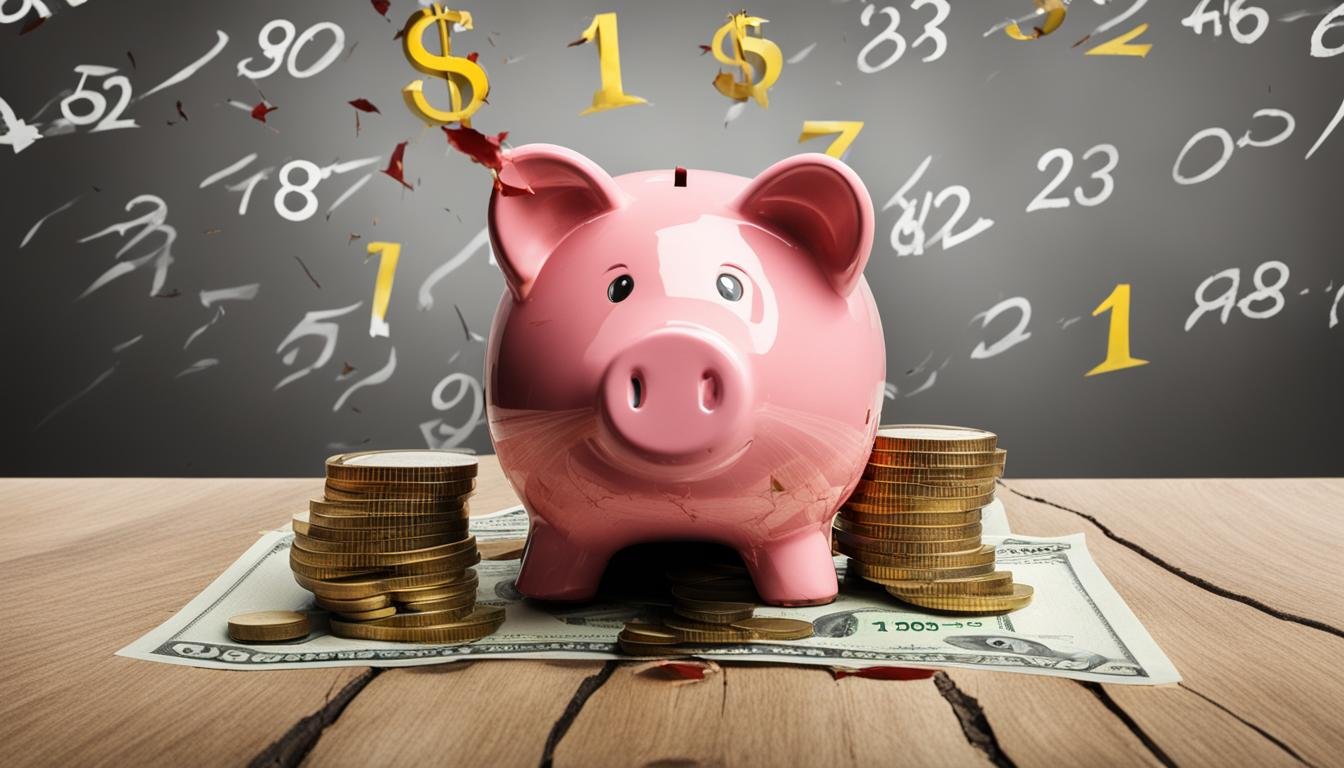Bankruptcy can have a significant impact on your credit score. When you file for bankruptcy, it tells lenders that you’re a credit risk, which can cause your credit score to drop dramatically. The bankruptcy will be reflected on your credit score for as long as 7-to-10 years, depending on the type of bankruptcy you file. However, it’s worth noting that if you already have a low credit score, bankruptcy can actually increase your score by clearing negative items from your credit report. Restoring your creditworthiness after bankruptcy takes time and effort, but it is possible.
Key Takeaways:
- Bankruptcy can cause your credit score to drop significantly.
- Chapter 7 and Chapter 13 bankruptcies can remain on your credit report for up to 7-to-10 years.
- If you already have a low credit score, bankruptcy can potentially improve your score by clearing negative items.
- Rebuilding your credit after bankruptcy requires consistent effort, such as paying bills on time and keeping balances low.
- Consider alternatives to bankruptcy, such as debt consolidation or a debt management plan, before making a decision.
The Impact of Bankruptcy on Your Credit Score
Filing for bankruptcy can have a severe impact on your credit score. It is important to understand how this financial decision can affect your creditworthiness and ability to secure new credit.
When you file for bankruptcy, it becomes a major red flag to lenders and creditors. As a result, your credit score may decrease significantly. On average, a person with a credit score of 680 can expect to lose between 130 and 150 points after filing for bankruptcy, while someone with a credit score of 780 could experience a decrease of 200 to 240 points.
Furthermore, the bankruptcy information will remain on your credit report for 7 to 10 years, depending on the type of bankruptcy you file. During this time, it will be listed as a public record, making it challenging to obtain new credit. Lenders may consider you a risky borrower, and if you are approved for credit, you may face high-interest rates and unfavorable terms.
Rebuilding your credit score after bankruptcy requires time and effort. It’s important to demonstrate responsible financial behavior to improve your creditworthiness. This includes paying your bills on time and in full, managing your existing credit accounts wisely, and keeping your credit utilization low.
| Impact of Bankruptcy on Credit Score | Credit Score Range | Expected Point Decrease |
|---|---|---|
| Person A | 680 | 130-150 points |
| Person B | 780 | 200-240 points |
While bankruptcy can have a significant impact on your credit score, it’s important not to lose hope. With time and responsible financial habits, you can rebuild your credit and improve your creditworthiness.
Rebuilding Your Credit After Bankruptcy
Despite the negative impact of bankruptcy on your credit score, it is possible to rebuild your credit over time. One important step is to pay your bills on time and in full, as payment history is a crucial factor in determining your credit score. **Improving creditworthiness after bankruptcy** requires a commitment to responsible financial behavior.
Another effective strategy is to open a secured credit card. With a secured credit card, you provide a deposit that serves as collateral for your credit limit. By using the card and making regular, timely payments, you can demonstrate responsible credit behavior and rebuild your creditworthiness. It’s important to choose a secured credit card that reports your payment history to the major credit bureaus.
Monitoring your credit score regularly is crucial when rebuilding credit after bankruptcy. By staying informed about your creditworthiness, you can track your progress and identify any errors or discrepancies that may be negatively impacting your score. There are many free online tools and resources available that can help you monitor your credit score and reports.
In addition, keeping your balances low relative to your credit limit is important for rebuilding your credit. High balances can negatively impact your credit utilization ratio, which is the ratio of your credit card balances to your credit limits. Aim to keep your balances below 30% of your available credit limit to improve your creditworthiness.
Rebuilding credit after bankruptcy requires patience and consistent effort. It may take several years to fully recover and improve your credit score. However, by following these steps and maintaining responsible financial habits, you can gradually rebuild your credit and improve your creditworthiness.
Alternatives to Bankruptcy
When facing overwhelming debt, bankruptcy may seem like the only option. However, there are alternatives to bankruptcy that can help you manage your debt while minimizing the negative impact on your credit score. Consider these options before making a decision.
Debt Consolidation: Debt consolidation involves taking out a loan to pay off multiple debts. By consolidating your debts into a single loan, you can potentially lower your interest rates and make it easier to manage your payments. This can provide some relief and allow you to regain control of your finances.
Debt Management Plan: Another alternative is a debt management plan. This involves working with a credit counseling agency to develop a plan to repay your debts over a fixed period. The credit counseling agency will negotiate with your creditors to potentially lower interest rates and create a more affordable repayment plan.
Debt Settlement: If you are unable to repay your debts in full, debt settlement may be an option. This involves negotiating with your creditors to pay less than what you owe. While debt settlement may have a negative impact on your credit score, it can provide you with a chance to settle your debts and regain financial stability.
Before deciding on any of these alternatives, it’s important to carefully consider your financial situation and consult with a credit counselor or bankruptcy attorney. They can help you assess your options and guide you towards the best solution for your specific circumstances. Remember, bankruptcy should only be considered as a last resort, and exploring these alternatives may provide you with a viable path towards debt relief.





